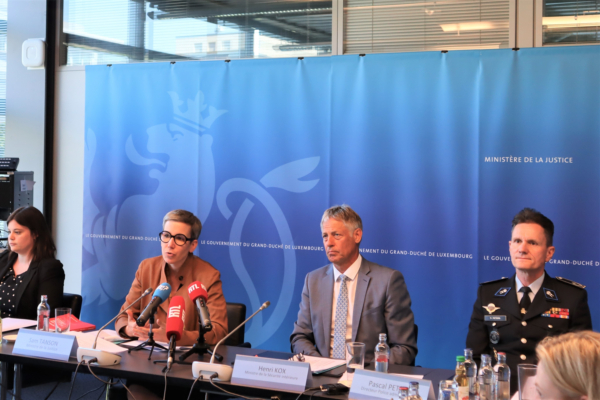 (L-R) Tara Desorbay, Ministry of Justice; Sam Tanson, Minister of Justice; Henri Kox, Minister of Internal Security; Pascal Peters, director of the administrative police;
Credit: MJUST
(L-R) Tara Desorbay, Ministry of Justice; Sam Tanson, Minister of Justice; Henri Kox, Minister of Internal Security; Pascal Peters, director of the administrative police;
Credit: MJUST
On Wednesday 18 May 2022, Luxembourg's Minister of Justice, Sam Tanson, and the Minister of Internal Security, Henri Kox, presented the results of the demonstrations, including the measures taken by the Ministry of Internal Security and the legislative provisions decided upon following the demonstrations in order to prevent and repress future overflows.
Following the proliferation of attacks on law enforcement officers and the violent behaviour that punctuated demonstrations against health measures linked to COVID-19, the government decided to strengthen the legal framework to further protect security forces and at the same time accentuate everyone's right to respect for private and family life in the digital age.
Summary of events
The demonstrations experienced by Luxembourg as part of the anti-COVID measures represented a new phenomenon for the country, with a series of unknowns for the Grand Ducal police who had to adapt from week to week. Despite the various difficulties, Luxembourg, unlike its neighbours, fortunately did not deplore any casualties and did not record any major material damage.
Out of a total of twelve demonstrations in twelve weeks, an average of 400 police officers were on duty per event, twice calling on their Belgian counterparts. The Ministry of Internal Security has decided on nine occasions to invoke the legal possibilities of Article 5 of the Police Act to carry out identity checks on public roads. Consequently, the police recorded approximately 751 identity checks and around twenty identity checks between 10 December 2021 and 12 February 2022. Also, around twenty administrative detentions had to be carried out.
Measures taken and security strategy
The twelve protests also gave authorities to pause and draw a number of conclusions. In particular, that security remains a shared responsibility – between national and local authorities. Indeed, the good collaboration between the police and the Luxembourg-ville, has allowed an optimal supervision of the demonstrations against the anti-COVID measures. In addition, the government's desire to create an appropriate legal framework to regulate demonstrations throughout the country has led to the establishment of a working group which is currently examining the drafting of such a law.
Another conclusion was the need to properly equip the police for their missions, both in terms of modern tools, infrastructure and personnel. Thus, extraordinary recruitment within the Grand Ducal police remains a priority for the government. As a reminder, 200 trainee police officers arrived on the ground on 2 May 2022, at the same time, 200 new candidates returned to the police academy.
The objectives of the legislative amendments
The amendments which will supplement the Criminal Code and the Code of Criminal Procedure aim to deter and punish violent behavior in all its forms, to effectively punish acts of violence, committed in particular during demonstrations, likely to disturb public order and to prevent the emergence of ultra-violent movements and individuals, whose sole purpose is to commit degradation and physical attacks during peaceful demonstrations.
In addition to the police, these targeted criminal provisions also target parliamentary and government representatives, professional journalists and any person in the public domain who, by virtue of their duties, are exposed to increased risks.
Amendments to the Penal Code and the Code of Criminal Procedure
The five points supplementing the Criminal Code and the Code of Criminal Procedure are:
- Increase in the scale of sanctions in the event of rebellion.
- Extension of the offence of contempt provided for in articles 275 and 276 of the Penal Code (spitting, smoke, etc.).
- Introduction of a new type of threat of attack on public security (Article 328), which punishes anyone who has disseminated or spread potentially dangerous substances that may inspire serious fears of an attack on persons or property.
- Creation of an offence of endangering the life of others, sanctioning the dissemination of information on a person allowing him to be identified or located, with a view to exposing him or the members of his family to a risk of direct harm to persons and property (doxing).
- Extension of the investigation under pseudonym by electronic means within the framework of legal proceedings for all crimes and misdemeanors punishable by imprisonment. Previously, this procedure was limited to offenses against State security and acts of terrorism and terrorist financing.








